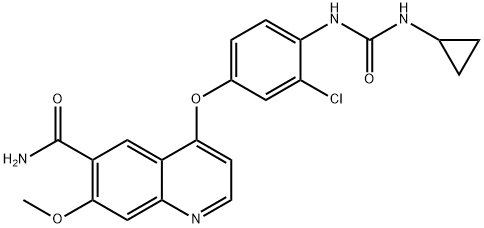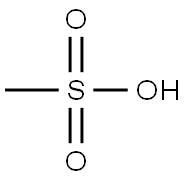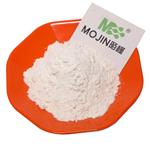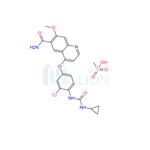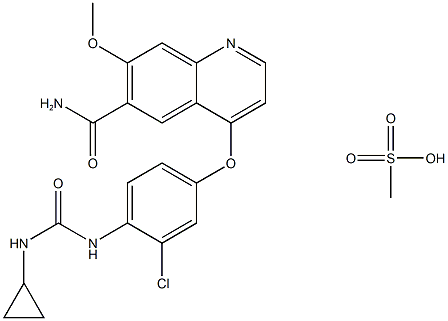
lenvatinib Mesylate
- Product Namelenvatinib Mesylate
- CAS857890-39-2
- CBNumberCB42651170
- MFC22H23ClN4O7S
- MW522.95862
- EINECS812-398-0
- MDL NumberMFCD18633219
- MOL File857890-39-2.mol
- MSDS FileSDS
Chemical Properties
| Melting point | >220°C (dec.) |
| storage temp. | -20°C Freezer |
| solubility | DMSO (Slightly), Methanol (Slightly) |
| form | Solid |
| color | White to Off-White |
| InChIKey | HWLFIUUAYLEFCT-UHFFFAOYSA-N |
| SMILES | O=C(N)C1C=C2C(N=CC=C2OC2C=C(Cl)C(NC(=O)NC3CC3)=CC=2)=CC=1OC.CS(=O)(O)=O |
| NCI Dictionary of Cancer Terms | lenvatinib mesylate |
| FDA UNII | 3J78384F61 |
| NCI Drug Dictionary | lenvatinib mesylate |
| UNSPSC Code | 12352200 |
| NACRES | NA.77 |
lenvatinib Mesylate Price
| Product number | Packaging | Price | Product description | Buy |
|---|---|---|---|---|
| Sigma-Aldrich SML3017 | 10MG | $94.2 | Lenvatinib mesylate ≥98% (HPLC) |
Buy |
| Sigma-Aldrich SML3017 | 50MG | $381 | Lenvatinib mesylate ≥98% (HPLC) |
Buy |
| Cayman Chemical 29832 | 500mg | $86 | Lenvatinib (mesylate) |
Buy |
| Cayman Chemical 29832 | 5g | $421 | Lenvatinib (mesylate) |
Buy |
| Cayman Chemical 29832 | 1g | $135 | Lenvatinib (mesylate) |
Buy |
lenvatinib Mesylate Chemical Properties,Usage,Production
Description
Lenvatinib mesylate (lenvatinib) is an oral targeted therapy medicine known as a receptor‐type tyrosine kinase inhibitor. It is a small-molecule drug (a drug that can enter cells easily), which was developed at Eisai in 2015. It was approved by the FDA in 2015 for the treatment of differentiated thyroid cancer that is either locally recurrent, metastatic, or progressive and did not respond to radioactive iodine treatment. In May 2016, the FDA approved the drug as a combination therapy with everolimus for the treatment of advanced renal cell carcinoma. Because VEGF (and fibroblast growth factor receptors, known as FGFRs) are thought to play a role in cardiovascular signaling pathways, VEGF2R and FGFR inhibition are thought to be the mechanisms behind the primary side effect of lenvatinib mesylate, which is hypertension.Uses
Lenvatinib mesylate is used in cancer:(1) Endometrial carcinoma that is advanced and got worse after other systemic therapies. It is used with pembrolizumab in patients whose cancer is not microsatellite instability-high (MSI-H) or mismatch repair deficient (dMMR) and cannot be treated with surgery or radiation therapy.(2) Hepatocellular carcinoma (a type of liver cancer). It is used as the first treatment in patients whose cancer cannot be removed by surgery.(3) Renal cell carcinoma (a type of kidney cancer) that is advanced(4)Thyroid cancer in certain patients whose cancer got worse, came back, or has spread to other parts of the body and did not respond to treatment with radioactive iodine.(5) Lenvatinib Mesylate is used in preparation of anti-human CTLA4xPD-1 bispecific antibodies for diagnosis, prevention and treatment of tumor or anemia.Lenvatinib mesylate is also being studied in the treatment of other types of cancer.
Uses
E7080 (Lenvatinib) is a multi-target inhibitor of VEGFR2 and VEGFR3 with IC50 of 4 nM and 5.2 nM, respectively.Definition
ChEBI: Lenvatinib mesylate is a methanesulfonate salt obtained by reaction of lenvatinib with one molar equivalent of methanesulfonic acid. A multi-kinase inhibitor and orphan drug used (as its mesylate salt) for the treatment of various types of thyroid cancer that do not respond to radioiodine. It has a role as an EC 2.7.10.1 (receptor protein-tyrosine kinase) inhibitor, a fibroblast growth factor receptor antagonist, an orphan drug, a vascular endothelial growth factor receptor antagonist and an antineoplastic agent. It contains a lenvatinib(1+).Mechanism of action
Lenvatinib mesylate works by blocking proteins that signal cancer cells to multiply. It also blocks proteins that signal the formation of new blood vessels that are needed to support tumor growth. Blocking these signals keeps cancer cells from growing.Pharmacokinetics
Lenvatinib is rapidly absorbed after oral administration, with tmax typically observed at 1 to 4 hours postdose. Food does not affect the extent of absorption but slows the rate of absorption. When administered with food to healthy subjects, peak plasma concentrations are delayed by 2 hours.In vitro binding of lenvatinib to human plasma proteins was high and ranged from 98% to 99% (0.3 – 30 μg/mL, lenvatinib Mesylate). This binding was mainly to albumin with minor binding to α1-acid glycoprotein and γ-globulin. In vitro, the lenvatinib blood-to-plasma concentration ratio ranged from 0.589 to 0.608 (0.1 - 10 μg/mL, lenvatinib Mesylate). Lenvatinib is a substrate for P-gp and BCRP. Lenvatinib is not a substrate for OAT1, OAT3, OATP1B1, OATP1B3, OCT1, OCT2, or the BSEP.
Side effects
The most prevalent AEs were hypertension (77.8%), fatigue (55.6%), weight loss (51.9%).In addition, there may be fatigue or tiredness, rashes, redness, itching or peeling of the palms and soles of the feet, diarrhoea, nausea, constipation and heartburn.Synthesis
Starting from commercial aniline 193, a substitution reaction under neutral conditions in warm isopropyl alcohol with a commercial vinyl methoxy derivative of Meldrum?ˉs acid (194) produced enamine 195 in good yield. Next, subjection of 195 to DOWTHERM A at 190 ??C affected an intramolecular cyclizative substitution reaction, followed by loss of acetone, and a decarboxylation reaction to furnish quinolone 196. This cyclization reaction, which is a variant of the Conrad-Limpach reaction, is particularly noteworthy given the temperature and pH at which it takes place. Conrad- Limpach cyclizations typically proceed under basic conditions at temperatures well above 240 ??C. However, a process was developed by Zeneca in 2004 which involved subjecting 195 to the DOWTHERM heat transfer fluid (commercially available from Dow and Sigma-Aldrich, consisting of a eutectic mixture of biphenyl and diphenyl oxide) allowed the team to lower the temperature required for the reaction, clearly observe bubbling of gas indicating the progress of the reaction, and simple cooling and treatment with ether to facilitated precipitate formation. The resulting solid could be collected by filtration and required no additional purification on scale in 80% yield. Quinoline 196 was then converted to the corresponding chloride using thionyl chloride in refluxing DMF, and the resulting ester 197 was converted to the corresponding amide through the use of 28% aqueous ammonia in warm ethanol, which ultimately produced the key chloroquinoline lenvatinib subunit 198 in 80% yield from 197.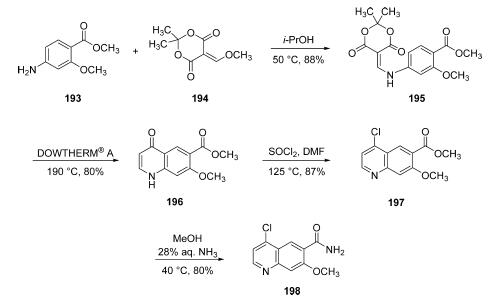
Commercial aminophenol 199 was converted to the corresponding carbamate through the use of phenyl chloroformate in essentially quantitative yield prior to subjection to cyclopropylamine in chilled DMF, which ultimately furnished urea 201 in 77% overall yield from 200. Next, exposure of phenol 201 to chloroquinoline 198 in the presence of potassium t-butoxide followed by treatment with methanesulfonic acid and acetic acid resulted in clean formation of lenvatinib mesylate (XXV) in 96% yield across the two-step sequence.
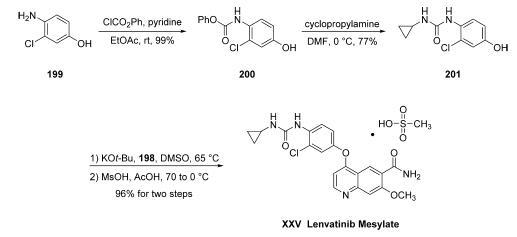
Solubility in water
lenvatinib Mesylate is a white powder sparingly soluble in acetic acid and slightly soluble in water. It is very slightly soluble in 1,3-dimethyl-2-imidazolidinone and practically insoluble in acetonitrile, dehydrated ethanol, 1-propanol, 2-propanol, 1-octanol, and isopropyl acetate. In aqueous solutions, lenvatinib mesylate is slightly soluble in 0.1 mol/L HCl and practically insoluble in Britton-Robinson buffer, pH 3-11.Preparation Products And Raw materials
Raw materials
lenvatinib Mesylate Supplier
Global(382)Suppliers
| Supplier | Tel | Country | ProdList | Advantage | ||
|---|---|---|---|---|---|---|
| +8613651027935 | rachel@mesochem.com | China | 191 | 58 | ||
| +86-15552509998 +86-15621883869 |
liutf@jewim.com.cn | China | 251 | 58 | ||
| +86-0531-69954981 +8615666777973 |
dwyane.wang@boyuanpharm.com | China | 211 | 58 | ||
| +8615066764791 | liangfulin@fengjin-pharma.com | China | 8 | 58 | ||
| +86-18600796368 +86-18600796368 |
sales@sjar-tech.com | China | 484 | 58 | ||
| +86-0086-531-88259693 +86-18660188356 |
tracy.li@zisonpharm.com | China | 78 | 58 | ||
| +86-13131129325 | sales1@chuanghaibio.com | China | 5887 | 58 | ||
| 0592-5800732; +8613806035118 |
xie@china-sinoway.com | China | 988 | 58 | ||
| +86-53169958659 +86-13153181156 |
sales@sdperfect.com | China | 294 | 58 | ||
| +86-17331933971 +86-17331933971 |
deasea125996@gmail.com | China | 2472 | 58 |
Related articles
Synthesis and Application of Lenvatinib Mesylate
Lenvatinib Mesylate is a multitarget tyrosine kinase inhibitor that may act on a variety of cancers.
Aug 5,2022
857890-39-2, lenvatinib MesylateRelated Search
PROMPT×
PROMPT
The What'sApp is temporarily not supported in mainland China
The What'sApp is temporarily not supported in mainland China
Cancel
Determine
